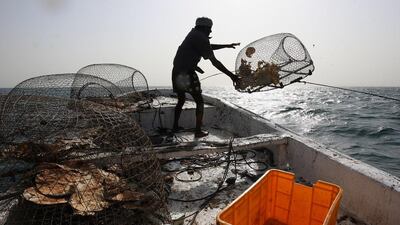When it comes to ensuring that future generations enjoy the Gulf's fish stocks, the first step has to be finding out what is caught. It is impossible to set sustainable fishing rates without knowing how many fish and of what species are being harvested.
With or without precise figures, however, it's clear that the problem is serious. As the minister of environment told the Federal National Council recently, fish stocks in the Gulf fell by 88 per cent between 1975 and 2011. In almost the same period, the number of people employed in the fishing industry increased dramatically, rising to 24,765 in 2011.
Clearly there must have been enough for the new workers to do. New research, reported by The National offers some indication of what that might be. According to the study by Dalal Al Abdulrazzak, a Kuwaiti postgraduate student at the University of British Columbia in Canada, the Gulf's annual catch was 31,400 tonnes, which is far higher than the 5,260 tonnes officially reported to the UN's Food and Agriculture Organisation. Ms Al Abdulrazzak discovered the alarming discrepancy after she sought to identify fishing weirs or tidal fish traps. She found a great many more than previously thought and computed the likely annual haul using data for average daily catches.
This is a problem with many ramifications, not least for the region’s ecological health and food security. As Ms Al Abdulrazzak says, fish is the Gulf region’s second most important natural resource after oil. It is a challenge to ensure that the fishing industry is sustainable, especially since much of the Gulf is international waters, outside of any single country’s jurisdiction. Any initiative by the UAE to allow endangered fish stocks to recover is unlikely to work unless Oman, Qatar, Saudi Arabia, Bahrain, Kuwait and Iran agree to comply.
Generations of people from this region have relied on the bounty of the Gulf. It would be a tragedy if tomorrow’s Emiratis were not able to enjoy the taste if a hammour or a kingfish.

